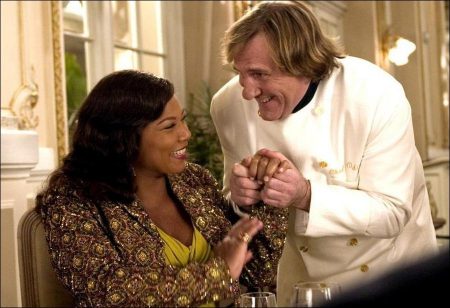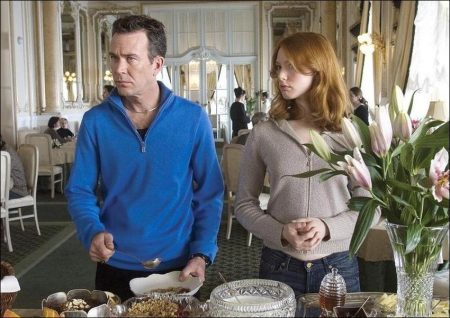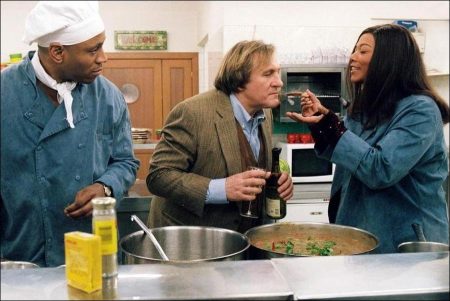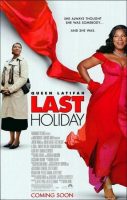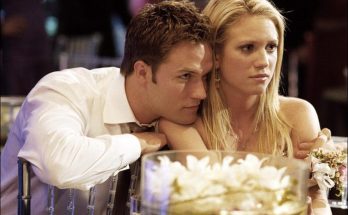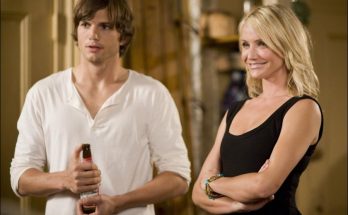Taglines: She Always Thought She Was Somebody… And She Was.
Georgia Byrd (Queen Latifah) lives a small life tucked inside big dreams. A shy cookware salesperson for a department store, she handles knives and skillets with the flair of a master chef. But when a misdiagnosis leads Georgia to believe her days are numbered, she decides that if she has to go, she’s going to go with a bang – and embarks on a dream holiday vacation to a grand resort in Europe.
There, thinking she has nothing to lose, Georgia undergoes a metamorphosis… and her transformation affects everyone around her. Georgia’s newly uninhibited personality shakes up staff and guests alike, including a venerated chef (Gerard Depardieu) as well as her retail magnate boss (Timothy Hutton), who becomes convinced she’s a rival intent on sabotaging his business plans. From snowy slopes to spectacular spas, delectable dinners to midnight balls, Georgia is going to live a lifetime of fun in just a few weeks…
Last Holiday is a 2006 American comedy-drama film starring Queen Latifah and directed by Wayne Wang. Latifah plays a humble store assistant, Georgia, who is told that she has a rare brain condition, and only a few weeks to live. She decides to spend her last funds on a luxury holiday in Europe before she dies.
The screenplay by Jeffrey Price and Peter S. Seaman was loosely adapted from the 1950 UK film of the same name by J. B. Priestley. The writers were wanting John Candy for the star-role, but he died and Latifah’s agent suggested a new version starring her. It gained mixed reviews, but Latifah’s performance was universally praised for charm and humor.
About the Production
“Georgia Byrd has always bent over backwards for everyone else – she’s felt like her proper place was at the end of the line,” says Queen Latifah, who plays the lead in the new comedy from Paramount Pictures, “Last Holiday.” “Now, for the first time in her life, at what she thinks is the end of her life, Georgia’s going to do something strictly for herself. She’s going to live like a queen.”
Confident and relaxed when in the kitchen, awkward and uncertain when not, Georgia sings in the church choir, always softly, and observes the world safely from the sidelines. When, after a misdiagnosis, she’s told her number’s up, Georgia decides she hasn’t a moment to lose and begins to make up for lost time. Cashing in her savings, Georgia heads for the beautiful Grandhotel Pupp in the central European resort village of Karlovy Vary, intent on going out with a bang…
“When she thinks she’s going to die, Georgia is unafraid to put herself in jeopardy,” says producer Jack Rapke. “She’s base-jumping off bridges, snowboarding down steep mountains… people are in awe. They are transformed by her.”
“To be sure, this movie is meant to be funny, but hopefully, it’s more than that,” says producer Laurence Mark. “You can really root for this character – getting behind what she’s up to and becoming emotionally involved with her. What Georgia is saying is: `Life is a banquet – don’t be afraid to eat up.’”
Says director Wayne Wang, “When Georgia is told – mistakenly – that she has but a few weeks to live, she gives up all the protective shields she’s built around herself. Feeling invulnerable, she embraces the challenges and excitement life provides when you are willing to surrender your fears.”
LL Cool J co-stars as Queen Latifah’s co-worker, Sean Matthews, who also struggles to find the things in life that truly motivate him. When Georgia takes off on her adventure, it inspires Sean as well. “She just disappears,” says LL Cool J, “and then he hears this crazy news about the things that are going on with her.”
In the movie, Georgia loves to spend time in the kitchen and her transformation is evidenced there. Once a reserved cook who didn’t dare to taste her non-dietetic culinary creations, she now learns to put everything on the line and enjoy the food that makes life worth living. The story gave Latifah the opportunity to work with some of the biggest celebrity chefs in the business; Emeril Lagasse and other Food Network cooks were the geniuses behind the film’s sumptuous meals. Latifah even learned how to make Emeril’s Chicken Tchoupitoulas!
Queen Latifah says that the comedy taps into a basic human emotion. “Try to imagine how you would feel if you were told that you only had a few weeks left. All the dreams, all the desires, all the things you wanted to do and thoughts you wanted to express… and now you’re told that your time is up. Where do you begin?”
Screenwriters Jeffrey Price and Peter S. Seaman began with the 1950 classic starring Alec Guinness. After Mark and Rapke signed on to produce, Queen Latifah took an interest in the project.
Finding the right director to juggle the humor and the drama of the story was a crucial decision that early on pointed in a clear direction, according to Mark. The producer, who had previously worked with Wayne Wang on “Anywhere But Here,” says Wang is “one of the few directors who can artfully balance comedy and emotion. He knows how to draw performances from actors, and humor from context and characters.”
Rapke concurs, “Wayne fully understood the tone of the material and the characters, and saw that underneath the comedy and the wonderful presence of Latifah is a poignant story with substantial themes. He knew how to get at the heart of the movie.”
Known for juxtaposing high concept studio fare like “Maid in Manhattan” with personal stories such as “Eat a Bowl of Tea” and “Smoke,” Wang was drawn to the project because of its examination of the unexpected twists and turns of everyday life. “I’ve always been fascinated by the idea of living for the moment, as if every single day counts,” he says. “It’s something I’ve attempted to explore both in my work and personal life – with equal amounts of success and failure.”
“It’s a fascinating concept that applies to every single human being: How do you live life to the fullest? How do you make the most of the time you’re given?” says producer Laurence Mark.
Wang suggests that perhaps life’s single greatest challenge is to be responsible to your future without neglecting the opportunities of the present.
“At the time I was given the script I had recently lost my father, who was a cautious man, to an accident,” Wang says. “It reminded me of how many situations we encounter each day that are uncontrollable, despite our precautions, and inspired me to want to explore the idea of the preciousness of life and the unpredictability of fate.”
About the Characters
Queen Latifah takes on the lead role, a part that allows her to play against type as a meek, churchgoing lady who makes an incredible transformation that also affects everyone around her.
“Queen Latifah can convey an irresistible warmth and humanity in addition to the brash comedic persona that audiences know,” says screenwriter Jeffrey Price. “With Queen in the role, we were able to fully develop a character arc that allows us to see both sides – the introverted person she starts out as and the outgoing woman she becomes.”
Latifah’s stature as a comedic actress has grown since garnering an Academy Award® nomination for her turn as Mama Morton in “Chicago” and her starring role in the box-office hit “Bringing Down the House.” She says she was drawn to “Last Holiday” by the challenge it presented to her.
“This was the chance to get into the bones of someone very different from me,” she notes. “Most of the characters I’ve played are vocal and outgoing and this was a chance to embody someone who is meek and unaccustomed to speaking her mind. Georgia became one of my favorite characters because she’s so decent and inspiring.”
Still, the actress says that she does, in fact, have a shy side. “Latifah means `delicate and sensitive,’” she notes. “I just indulged that side of myself a little more than I usually do.”
Latifah says that, like her character, she is thrilled when new opportunities present themselves. “I learned how to snowboard for this project, which is one of the things I love about the job – the chance to do new things,” says Latifah. “I’m an active person – I ride motorcycles, I’ve snowmobiled and skied… I like to embrace the adventure of life, which helps me in translating that attitude to my character.”
“At the beginning of the movie, Latifah plays a character completely different from the way I’ve always imagined her,” says the director, Wayne Wang. “Georgia starts out emotionally handicapped, someone who can’t really speak her mind. Latifah really dug deep and came through with those scenes as the character deals with her own emotions about dying.”
LL Cool J, who has known Latifah for many years, takes on the role of Sean, Georgia’s co-worker and the object of a crush. For that part of the role, Latifah was able to call back old feelings. “He’s a very handsome guy and I sort of had a crush on him when I was growing up,” Latifah admits, “so I just recall how I felt when I had his poster on my wall.”
“Really? I didn’t know that,” LL Cool J responds with surprise when told of Latifah’s childhood infatuation. “We’ve known each other a long time, and playing scenes with her has been wonderful. She’s such a smart young woman. She’s taught me a few things.”
“We needed someone who could establish a presence and a chemistry with Queen Latifah,” says Laurence Mark. “LL Cool J fit the bill perfectly. He’s known Latifah for a long time and their connection and affection for each other is apparent.”
Says Rapke, “We looked at a lot of people for that role, but loved Cool J because, like Latifah, we were casting him against type. You would never think of him as shy or lacking in confidence. His chemistry with Latifah is spectacular.”
Calling the role his “homage to the working man,” LL Cool J was indeed interested in the role because it was so unlike any other he had played.
“I met with Wayne and we had a nice conversation about where we could go with this role and what I wanted to do with it,” he says. “I was excited to play someone who isn’t doing something heroic or action-oriented. He’s just a regular Joe with limited life experiences. People like Sean can be overlooked because they’re quiet and don’t draw attention to themselves. You know, not everyone is super-confident. Not everyone is super-sharp. Not everyone has the boldness to approach someone they’re interested in. But shyness is endearing. It shows decency, humility.
“The two of them fall in love in an innocent manner — there’s nothing calculating or manipulative about it, no hidden agendas,” continues LL Cool J. “I think, in general, relationships that happen slowly, organically, tend to be healthier and last longer.”
For the role of Didier, the brilliant, volatile, mischievous, seasoned chef at the Grandhotel Pupp, the producers turned to a larger-than-life actor who could embody all facets of the character: Gerard Depardieu. The French icon is now in self-professed semi-retirement, and “Last Holiday” could very well represent his last American film role.
“From the very beginning of our discussions about the character of Didier, we always said, `Let’s see if we can get someone like Depardieu,’” says Jack Rapke. “Then we said, `Well, why don’t we just see if we can get Depardieu?’”
The role held a natural appeal to the venerated French actor, restaurateur and vintner. “I have a passion for food,” he says. “When someone asks me how I am, I say, `Great, I just had a wonderful steak.’ This role for me is like a wonderful steak.”
Says Wayne Wang, “During pre-production I read an article in the New York Times Magazine about Depardieu’s restaurant and his knowledge of cuisine. I was excited that he would be bringing such joy and enthusiasm to the movie.”
Laurence Mark adds, “Chef Didier is in many ways the mentor of the film, a guiding figure who comforts and inspires Georgia.”
Georgia’s and Sean’s boss is Matthew Kragen, a would-be Donald Trump who wants to have it all. A man who’s lost sight of what really counts in life, Kragen is constantly seeking out bigger and bigger deals and not worrying about whom he might be stepping on along the way.
The search for someone with the acting chops to play a narcissistic antagonist who’s not entirely unsympathetic led filmmakers to Timothy Hutton, whom Wayne Wang has admired and followed since his Oscar® winning performance in “Ordinary People.”
“Tim can offer such a range of interpretations of scenes, from quiet and controlled to over-the-top outrageous,” remarks Wang. “He creates a great palette to work with and has the ability to make a somewhat villainous character appealing and identifiable, even when he’s doing something unsavory.”
Says Hutton, “Kragen is a control freak. If anything changes ever so slightly, it throws him completely out of whack. He’s a fun character to play.”
According to Latifah, Hutton was well-suited to play the one-upping Kragen. “Tim Hutton is crazy, a nut. He really doesn’t need a stuntman,” she adds. “He’ll do all of these dangerous moves on his own, if you let him. You got to grab him and say, `We don’t want you to jump off the mountain this time.’”
About the Food
In “Last Holiday,” Georgia dreams of one day owning her own restaurant, but lacks the self-confidence to see her dreams become a reality. When she arrives in Europe, she meets the world-renowned Chef Didier, who is impressed with her taste for food and lust for life.
A food lover, director Wayne Wang has dealt lovingly with the culinary arts previously in such films as “Eat a Bowl of Tea” and “Dim Sum” and with this project wanted to take the preparation and presentation of food to an even higher level.
“I wanted to make a bigger meal of the food in this film, so to speak,” says Wang. “We met with Susan Stockton at the Food Network in New York; I stressed a desire for fresh ingredients and for the food to look organic and rustic. I really liked the idea of a French chef working in Central Europe during the winter – a man who has to be very creative in preparing dishes as he doesn’t have access to all the produce he might have in Paris.”
Wang toured the Food Network’s studios in New York and began coordinating with Stockton the enormous variety and number of meals that would need to be prepared.
“We do several live shows daily in the studio, plus location work across the country, so we are well-trained and prepared for this kind of thing,” says Stockton. “All of our cooks are also food stylists – they know how to make food look good on camera.”
Seven Food Network chefs assisted in the preparation of the film food in New Orleans, which required making numerous servings of the same dish, explains prop master Douglas Fox, who coordinated the effort. “The chefs had to have several options available each day, just in case the shooting order changed. In addition, we never knew how many takes would be needed to complete the scene. If the actor took a bite of the food, and then we shot another take, we had to have a fresh dish available. We tried to be prepared for as many as 10 takes, which meant having 10 versions of each dish.”
New Orleans is familiar territory for the Food Network, thanks to Emeril Lagasse’s popular show, which airs on the network and has its executive offices and recipe developers headquartered in the Crescent City. The participation of the famed Emeril, who has three restaurants in New Orleans, was a boon for the filmmakers.
Emeril recalls spending “a marathon day with Queen Latifah a few years ago during the shooting of an episode of `Who Wants to Be A Millionaire’ and falling in love with her passion and spirit. We had a terrific time together, so I was happy to lend a hand to the film. And I appreciated that the production was taking food preparation seriously.”
Early in the film, Georgia is seen watching and cooking along with a televised episode of an Emeril show in which he’s preparing a dish of his own creation, Chicken Tchoupitoulas. Emeril taped the program specifically for the film, and provided his cooking facility for Queen Latifah to practice making the dish during pre-production.
Says Susan Stockton, “Queen Latifah made Chicken Tchoupitoulas several times with our staff and did extremely well in the kitchen. She has good knife skills; she learns quickly and retains the knowledge.”
Several crewmembers were on hand to sample Latifah’s efforts, which met with unanimous approval. The large pans were empty within minutes. “I must have done all right,” Latifah laughs.
Georgia prepares such classic New Orleans dishes as jambalaya, pork chops and savory bread pudding. When she gets to Europe, as Georgia tastes the culinary creations of Chef Didier, her options become even more expansive
Georgia’s Dinner Menu
Warm lobster salad in potato nest with leeks and caviar
Cassoulet plated for one – gratineed with whole leg of duck on top
Risotto Barolo with winter vegetables and truffles
Beef goulash with assorted wild mushrooms and broad egg noodles with caraway
Rouget, citrus beurre blanc with capers and roasted heirloom potatoes
Roast free-range quail with brioche-currant stuffing
Lamb shanks served on soft polenta with blood-orange relish
And, for dessert… profiteroles with caramel, chocolate soufflé, fruit tartlets, and bombee flambé (Baked Alaska set aflame with rum).
Depardieu was personally involved in preparations for these lavish dinner scenes. Food Network advisor Susan Stockton flew to Paris to meet the actor at his restaurant, La Fontaine, where, over a three-hour dinner, they discussed the menus his character would create.
“Gerard is a chef with his own ideas, so I wanted to make sure he was simpatico with what we had in mind,” she recalls. “I didn’t want him to arrive on set and say, `Oh, I would never prepare lamb shanks that way.’ The first thing we did was check out his kitchen, which is what chefs always want to do. For dinner, he cooked us suckling pig on a spit. He was excited because he had just come back from a trip to the coast to get fish and oysters and had bought his own grapes for his wines.”
Says Depardieu, “Chefs in big hotels often have to work with a set menu, but Didier creates his own, working with whatever fresh ingredients he finds. He never repeats the same things.”
Stockton had already been in discussions for weeks with director Wang, who sent her a stream of emails and tear sheets from magazines depicting rustic food images. The foodies were then left to realize the director’s vision.
“There’s a dark wood table in the restaurant we call the food plateau, heaped with fish, wild greens, roasts, cheeses, fruit, wooden bowls,” she says. “It’s representative of the winter feasts common to the culture for centuries, and an example of how Wayne wanted to fill the screen with food.”
Stockton and her two key chefs, Jay Brooks and Krista Ruane, scouted the Hotel Pupp kitchen for three days and assembled a staff of 15 local chefs to assist in the procuring of ingredients and food preparation. They managed to get half their produce from the Czech Republic, the other half from France.
Rather than go to Europe with a menu in mind, Stockton’s crew strived for authenticity, planning a menu based on ingredients that the local chefs would use. “We asked the local chefs, `What’s your cream like? Where do you get good lamb?’” explains Stockton.
Stockton and her team were pleasantly surprised at the enormous size of the Pupp’s kitchen, which enabled them to work alongside the hotel cooking staff, which must prepare meals for guests of the hotel and its two restaurants.
“New York kitchens are small; every possible foot of expensive real estate is devoted to the dining area,” she says. “The Pupp’s kitchen is huge – not uncommon in these centuries-old European hotels because the chefs cooked over open fire and needed high ceilings for ventilation. The roominess allows great interaction with the hotel’s regular cooks. They’re learning things from us, we’re learning from them.”
One scene requires the preparation of 50 Baked Alaskas and an assortment of fish. “You always have to be aware of any food allergies among the cast, as they actually eat the food, sometimes take after take after take,” says Stockton.
To ensure the food looks fresh and piping hot from the kitchen, Wang gave the kitchen several minutes’ warning before takes and completed insert shots of the food even before shooting the establishing shots of the scene.
Says Wayne Wang, “I’m from the Bay Area, where chefs such as Alice Waters and Judy Rogers practice a school of natural cooking. Don’t use too much sauce or too many spices and really try to bring out the fresh tastes of the food. That’s what we’re trying to represent in the film.”
About the Locations, Photography, and Costumes
Production on “Last Holiday” began in New Orleans, which became a second home to many in the production. The city’s working-class neighborhoods (which, unfortunately, became well-known around the world after the devastating effects of Hurricane Katrina) provide a backdrop for the early part of the film as the home of the frugal Georgia.
“The residents of New Orleans were the best, the absolute best,” says producer Jack Rapke. “We were their guests and they treated us with their famous hospitality. Our entire production was aided by the people of that fine city – we’re all pulling for them now.”
“We steered away from the classical images of New Orleans, such as the Garden District, and are showing another side of the city,” says director of photography Geoffrey Simpson. “We depicted Georgia’s world as small and austere by framing shots in a way that makes the rooms feel cloistered.”
“The wonderful tradition of cuisine, the Southern Baptist church community, and the overall aesthetic of New Orleans served us well on an artistic level,” says executive producer Richard Vane.
Wayne Wang, who also directed “Because of Winn-Dixie” in New Orleans, says, “There is something about the south and the black community in New Orleans that is very soulful and real. Faith and church are vital, almost organic, to the community, which plays perfectly to Georgia’s character.”
This is exemplified in one memorable scene: when Georgia laments her ill fortune to God in the form of a spiritual. Filmed at the First Street United Methodist Church, the sequence involves some 200 extras, a five-piece band, and the outstanding 18-member choir from the New Orleans Ebenezer Baptist Church, seen in the Oscar® nominated film “Ray.”
LL Cool J also garnered considerable attention in New Orleans, drawing dozens of fans to shooting locations at a shopping mall and a hospital, where 10 female employees patiently waited for a chance to say hello. He made the rounds at the end of the day, sending some squealing nurses into near cardiac arrest. “It’s all about spreading the love,” he says. “Get love, give love.”
From New Orleans, the production moved to Europe, where the expansive landscapes provided a dramatic contrast with New Orleans. “Shooting Georgia Byrd, this quiet gal from New Orleans, at the top of this huge expanse, with these magic skies and incredible views, is one of the most rewarding visuals I’ve ever had the opportunity to shoot,” says Simpson.
That contrast is also evident in the costume changes. A woman whose frugality is reflected in her wardrobe in New Orleans, Georgia “becomes a peacock” in Europe, in the words of costume designer Daniel Orlandi.
For Georgia’s big meal scene, Orlandi dressed Latifah in a stunning red chiffon dress and Chopard diamond necklace. Orlandi says the necklace “framed her face beautifully without overpowering it. It was a stunning piece of jewelry that moved in ways costume jewelry doesn’t.” (Also not moving: the beefy security guard from Chopard, who stayed glued to Queen Latifah’s side whenever the necklace was brought out.)
Orlandi dressed Latifah in a green jersey jacket for the film’s second dinner scene and chose a beaded tux for the New Year’s Eve party.
Four different formal-dress evening scenes take place in the film, requiring Orlandi to fit 1,000 costumes: evening gowns, ball gowns, tuxedos and tails. All the clothing was purchased in Los Angeles and New Orleans and tailored individually in Karlovy Vary and Prague.
“We found beautiful extras and made them chic and stylish,” says Orlandi. “They ooze glamour. This is where the pretty people come to spend the holidays.”
Welcome to the GrandHotel Pupp
The stately Grandhotel Pupp – yes, a real hotel (with 228 rooms), which began construction in 1701 – is one of the venerated hotels of Central Europe and home to the annual Karlovy Vary Film Festival. Over the centuries it has hosted such luminaries as Peter the Great, Bach, Beethoven, Goethe, and numerous crowned princes of Europe. Renovated in 1893 and again in 2004, it served as lodging and location for six weeks of filming.
Says Richard Vane, “We searched for a gorgeous hotel in the Czech Republic where Georgia would walk in and go, `Wow.’ January and February are low season and the Pupp was undergoing some renovations, so we were able to make arrangements to basically take over the hotel. My favorite part of the deal is that the travel time for the crew is the two minutes it takes them to get from whatever floor they’re on to the lobby.”
The hotel’s ballrooms and suites provide large, impressive backdrops for filmmakers to create the magical, other-worldly feel Georgia experiences during her stay. Holiday lights and decorations add to the luster.
“Georgia arrives from New Orleans, where everything felt tightly enclosed, to this fabulous hotel with huge ceilings and golden angels hanging above chandeliers,” says director of photography Geoffrey Simpson. “Suddenly there’s all this fabulous space. We had snow almost every day in Karlovy Vary, even on the morning we shot Georgia arriving at the airport. It creates such an immediate, wonderful contrast with the New Orleans section of the film.”
Producer Jack Rapke says the hotel’s picturesque location was perfect for the film. “I’ve never seen so many people asking the still photographer to take their pictures, everyone wanting these gorgeous mountains in the background,” he says. “These are the pictures you hang on your wall. The beauty of this site will stay with us all forever.”
Last Holiday (2006)
Directed by: Wayne Wang
Starring: Queen Latifah, LL Cool J, Timothy Hutton, Gerard Depardieu, Alicia Witt, Giancarlo Esposito, Jane Adams, Michael Estime, Susan Kellermann, Jascha Washington
Screenplay by: Jeffrey Price
Production Design by: William Arnold
Cinematography by: Geoffrey Simpson
Film Editing by: Deirdre Slevin
Costume Design by: Daniel Orlandi
Set Decoration by: David Smith
Art Direction by: Richard L. Johnson, Martin Vackár
Music by: George Fenton
MPAA Rating: PG-13 for sexual reference.
Distributed by: Paramount Pictures
Release Date: January 13 2006
Visits: 38
